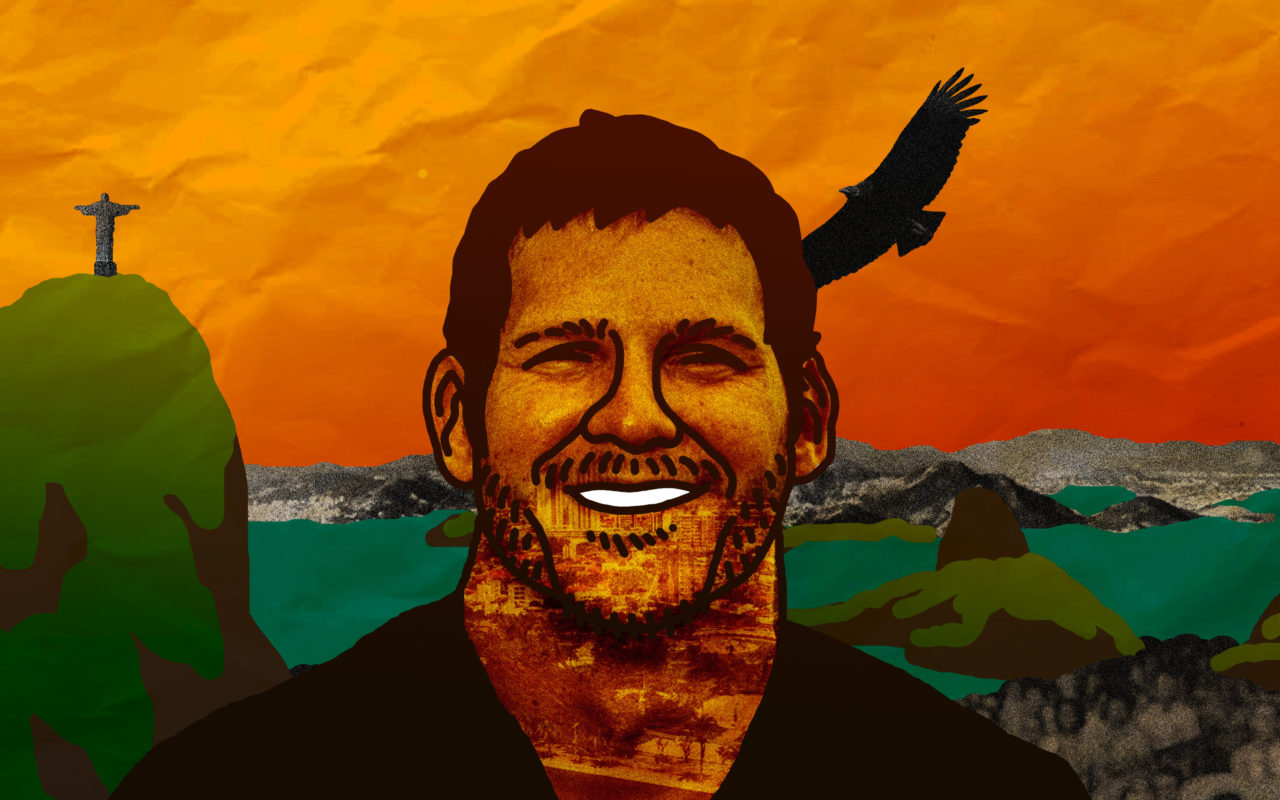Graduating from an American Ivy League university with a Master’s degree in public policy in 2009, Brazilian architect Pedro Henrique de Cristo had one goal - to go back to his home country and use his newly gained knowledge to make things better. He had many ideas on how he could do this.
In the euphoria and dissent leading up to Brazil hosting both the FIFA World Cup and Olympics in succession, he soon found himself in Vidigal, a picturesque but troubled favela overlooking Rio’s famous Ipanema Beach. Vidigal, the greenest but also one of the toughest favelas in the city for him, presented a challenge - it was a place where Pedro could see his skills and ideas having a real impact and being transformative. He wanted to be where the action was, so he moved in.
On arrival, and not knowing exactly what he was to do there, Pedro immersed himself into the community and got to know his new neighbours. Some were suspicious.
Not long after, Pedro realised something - for a long time, Vidigal had been used as a garbage dump, destroying its beautiful natural setting and exposing its residents to an unhealthy environment. It was also under threat of gentrification from unscrupulous developers working with dodgy politicians, and as he was to learn later, some residents. “I just got deeper, and deeper into the community, like, really got engaged, not just professionally, but personally,” Pedro says. “It changed my life”, he adds.
So, together with Mauro Quintanhila, who had been working to clean the neighbourhood up with a few friends for years, Pedro went to work. Not only would they clean up Vidigal, but within years, they would transform the area’s fortunes. A successful cleanup campaign resulted in forming the largest urban park in Brazil under the stewardship of the Vidigal community, with Pedro and its pitchman and chief architect. It was a remarkable success, and all sorts of accolades followed…then, things went unexpectedly wrong. “Our crime was we did everything right, and we made lots of money for the community”, says Pedro
___________________
EPISODE TRANSCRIPT
___________________
AX01:(FADE IN) IF YOU EVER MEET ANYBODY FROM HARVARD THAT BEFORE YOU ASK YOU, SAY TO YOU THEY WENT TO HARVARD, THEY ARE NOT NICE PEOPLE. DON'T BE FRIENDS WITH THEM, YOU KNOW, HAHAHA.
Tau: That’s Pedro / Henrique / de Cristo. He’s Brazilian / an architect / AND an urban designer...he’s also been a friend of mine for years. In 2009, he graduated from Harvard with a Masters in Public Policy. Pedro wanted to do big things...
AX02: I HAVE A TENDENCY IN MY PROJECTS TO BE QUITE OBSESSIVE, YOU KNOW, LIKE, FIRST I ANALYSE WHAT HAS TO BE DONE. AND THEN WHEN I REALISE THAT’S IT. I’M JUST SOMEONE TRYING TO LEARN CREATE AND DO THINGS TO CHANGE THE WORLD.
Tau: In college, he took classes to figure out what needed changing, and how to do it...
AX03: PEOPLE LIKE ME WERE LIKE, OK, BUT WHAT ARE THE MAIN CHALLENGES WE STILL HAVE TO SOLVE? AND IT WAS VERY CLEAR, YOU KNOW, LIKE WE HAD A BIG PROBLEM IN LIKE PUBLIC HEALTH, EDUCATION, SOCIO-ECONOMIC PROBLEMS.
Tau: After graduation, Pedro returned to Brazil with a head full of great ideas, AND a certified understanding of how to tackle key urban challenges. What was missing was the right place to test them out. That’s what led him to Vidigal, a favela that overlooks Ipanema Beach in Rio. At the time, Brazil was on a high — preparing to host the 2014 World Cup and 2016 Olympics.
AX04: IT WAS AMAZING, MAN. IT WAS JUST SOME...BECAUSE THE CLIMATE OF THE THINGS, THE ATMOSPHERE THAT WAS GOING ON WAS JUST WE COULD GET THINGS DONE, YOU KNOW. POOF
Tau: In today’s episode, we will look at what happened next, and ask the question...when you’re trying to do something meaningful, something that can impact other people’s lives - a whole community even - is a “good idea” enough? / and who gets to decide what good is anyway?
This is The City Show, I’m Tau Tavengwa.
Dhashen...and I’m Dhashen Moodley.
Tau: So Dhashen, you’ve been reporting this story.Where do we begin?
Dhashen: Tau, let me take you back to 2012, when Pedro’s living in Rio.
AX05: IT WAS A TIME VERY MUCH OF HOPE IN BRAZIL YOU KNOW, BRAZIL WAS IN THE RISE. EVERYBODY'S LIKE, OKAY, THIS IS THE TIME OF BRAZIL.
Dhashen: Everyone’s excited. Well, perhaps not everyone.
TAPE1: WHAT WE’RE SEEING IN BRAZIL IS REALLY UNPRECEDENTED IN RECENT MEMORY. LET ME SHOW YOU SOME OF THE HEADLINES HERE IN THE PAPERS, ”BRAZIL ON THE STREETS” PHOTOGRAPHS OF THE MORE THAN 100-THOUSAND PEOPLE THAT WERE IN RIO ON MONDAY. ( SLOW FADE OUT)
Dhashen: A mass movement spread across the country in 2012. In Rio and Sao Paulo, thousands of people joined the demonstrations. A year later, millions of Brazilians were on the streets in 80 cities across the country. All pushing back against a broad range of issues, from police brutality to the growing surveillance state. Pedro says, the angriest voices were always in the favelas.
AX07: THERE'S NOT CLASS WARFARE, IT'S CLASS DISPUTE, MAN. PEOPLE ARE NOT IN A WAR AGAINST THE RICH, PEOPLE ARE DEMANDING JUSTICE.
Dhashen: Simply, Brazil was failing to meet the most basic needs of many of its citizens. But, like many countries that host the World Cup, it was still spending billions of dollars on fancy new stadiums. The protests drove then-president Dilma Rouseff <<DJIL-muh roo-SEFF>> into making big, bold promises...
AX8: “THERE HAS BEEN A SURGE IN THE NUMBER OF CITIZENS WHO WANT MORE AND WHO HAVE THE RIGHT TO MORE. WE ARE FACING NEW CHALLENGES. THE PEOPLE WHO TOOK THE STREETS YESTERDAY ARE ASKING FOR MORE CITIZENSHIP, MORE HEALTH, BETTER EDUCATION, BETTER TRANSPORTATION, MORE OPPORTUNITIES. I GUARANTEE YOU THAT MY GOVERNMENT ALSO WANTS MORE. AND WE WILL GET MORE FOR OUR PEOPLE AND OUR COUNTRY.”
Dhashen: This was the moment Pedro was waiting for. All the pieces were lining up, and he felt it was the right time to act...
AX9: I REALISED, LOOK, THERE IS A WAVE OF PUBLIC WILL, POLITICAL WILL, FINANCIAL INTERESTS, OF MEDIA ATTENTION. AND MORE IMPORTANTLY, OF, LIKE THERE'S A WAVE OF THINGS THAT CAN BE CHANNELLED TO CHANGE SOMETHING, AND THE MAIN THING THAT RIO GOT THE OLYMPICS WAS BECAUSE RIO PROMISED AS A LEGACY TO INTEGRATE THE CITY.
Dhashen: Promises like these were inspiring to many Brazilians. Even Pedro quit his comfy desk job at the United Nations. He wanted to be on the ground, directing some of this new energy into his own projects. He felt he had to get to the heart of it all...and that meant living in a favela.
AX10: TO KNOW SOMETHING, I HAVE TO BE A PART OF IT, YOU KNOW. IF I'M NEVER PART OF THE FAVELA, I'LL NOT KNOW IT, OR THINK ABOUT IT, OR HAVE THE BEST RESEARCH, WHATEVER. BUT, TO KNOW, I HAVE TO BE THERE.
Dhashen: A quarter of Rio’s 7 million residents live in over a thousand favelas -- or informal settlements. These are dense, low income communities, with high crime and unemployment. But to Pedro, they’re also so much more.
AX11:THE FAVELA IS A STRIKING SERIES OF VISUALS THAT COME SHOCKING RIGHT IN BLOWING IN YOUR FACE AS SOON AS YOU GET THERE. IT'S VIBRANT WITH LIFE BECAUSE THERE IS A LOT OF YOUNG PEOPLE PEOPLE HAVE THIS MAGIC OF MOVING BETWEEN EACH… IT’S LIKE, LIKE RUSH HOUR. YOU LOOK AT TRAFFIC AND THEY SEEM NOT TO HIT EACH ONE. IT’S JUST SOMETHING UNBELIEVE... IT’S VERY KINETIC. BUT LIKE NOT ROMANTICISING THE FAVELA. BUT THE TRUTH, IT'S MORE COMMUNITARY BECAUSE PEOPLE NEED EACH OTHER TO REALLY SURVIVE.
Dhashen: Dhashen, that need to build a community for survival has a long history in Brazil. Favelas were formed by freed African slaves in the late 19th century. A lot of their direct descendants still live in poverty in these deprived settlements. In 1950, 200,000 Carioca lived in favelas. Today, it’s closer to 2 million.
But, let’s get back to Pedro...
AX12: OH YEAH YEAH YEAH YEAH, THAT’S A GOOD IDEA. GREAT.
Dhashen: He's excited. After the protests and the President's speech, Pedro decides that Vidigal is somewhere he could make a big difference. But first, he needed a place to stay.
AX13: I HAD A FRIEND OF MINE, A PHOTOGRAPHER THERE THAT LIVED THERE. I WAS LIKE, MAN, I WANT TO LIVE IN VIDIGAL. YOU KNOW. I THINK IT'S AMAZING. I WANT TO SEE WHAT'S UP. AND IT'S JUST LIKE, DUDE, JUST COME HAVE A BEER WITH ME. I’M HAVING OTHER FRIENDS. AND HE WAS SUPER COOL. JUST INTRODUCED ME TO EVERYONE. AND EH, I JUST LOOKED FOR A PLACE TO RENT AND I JUST WENT ON PEOPLE'S DOORS KNOCKING “ARE YOU RENTING THIS?”
Dhashen: Eventually, Pedro found a spare room above a bodega...
AX14: FIRST NIGHT I GOT THERE WAS EH I WAS REALLY NAIVE AND STUPID. I WAS JUST LIKE, OH MY GOD, IS SOMEBODY GOING TO COME IN MY ROOM THAT I RENTED HERE IN THE FAVELA FIRST NIGHT? FOR MY BRAZILIAN FRIENDS, IT WAS WAY MORE SHOCKING THAN WAS THEN TO MY FOREIGN FRIENDS. THE VIOLENCE IS SUCH A PROBLEM THAT EVERYBODY IN MIDDLE CLASS IS SO AFRAID TO GO ANYWHERE YOU KNOW.
Dhashen: During those first few weeks in Vidigal, Pedro merely observed the place, and got to know a few people.
AX15:IT WAS LIKE, I'M NOT GOING TO INVENT A PROJECT HERE. I'M GOING TO LOOK WHAT THE LOCAL PEOPLE, THE LEADERS OF THE TERRITORY ARE DOING. SO I'M GOING TO SEE WITH WHO I LIKE BEST AND WHAT I CAN DO BETTER TO EMPOWER THEN DO IT AND EVOLVE IT TOGETHER. BUT I'M NOT GOING TO COME LIKE A WHITE SAVIOUR AND LIKE, LET'S SAVE THE FAVELA LIKE I HEARD FROM MANY NGO LEADERS MANY TIMES YOU KNOW.
Dhashen: But that’s exactly how Pedro looks. He’s a blue-eyed, blonde-haired, middle-class white man...with a Harvard degree no less! This made his new neighbours suspicious.
AX16: SO THEY LOOK AT THIS WHITE GUY GETTING THERE. BUT WHEN I OPEN MY MOUTH, THEY'RE JUST LIKE, WAIT, ARE YOU FROM PARAIBA? ARE YOU NOT GRINGO?
Dhashen: Pedro IS from Paraiba --- a largely agricultural state in the northeast of Brazil -- where people have a very distinct Portuguese accent.
AX17: I WAS LIKE, YEAH. HE’S LIKE OH MY GOD, COME TAKE COFFEE IN MY HOUSE, MY MOM'S FROM PARAIBA. MY GRANDMOTHER, MY UNCLE, YOU KNOW.
Dhashen: Very slowly, he earned the trust of some community leaders. They taught him how the neighbourhood operates, and introduced him to more people.
AX18: I JUST WENT DEEPER AND DEEPER AND DEEPER WITH THE COMMUNITY, LIKE REALLY GOT ENGAGED. AND IN A PERSONAL SENSE ALSO, YOU KNOW, NOT JUST THE WORK.
Dhashen: Soon, Vidigal felt like Pedro’s second home.
AX19: THAT CHANGED MY LIFE COMPLETELY, YOU KNOW. AND I’M VERY THANKFUL TO ONE PERSON I JUST HAVE TO SAY THAT MAURO QUINTANIHLA…
Tau: When Pedro met Mauro, he saw a local leader who deeply cared about his community and its natural setting. With no budget and even less support, Mauro was running a clean up campaign that had over many years removed trash from all over the neighbourhood. So Pedro joined forces with him
AX20: AND THEN VIDIGAL IS JUST LIKE...IT'S JUST UNBELIEVABLE, MAN, YOU KNOW. SO ALL THESE PEOPLE, THIS CULTURE, THIS SITE, THIS BEAUTY AND THEN NATURE, IT'S THE GREENEST FAVELA IN RIO.
Tau: Eventually, Pedro and Mauro took over a former dumpsite in the heart of the favela, and transformed it.
AX21: WE CREATED THE FIRST URBAN PARK IN BRAZIL, LED AND MANAGED BY A COMMUNITY ORGANISATION IN A PUBLIC/PRIVATE COMMUNITY-LED PARTNERSHIP.
Dhashen: The Sitie Ecological Park, was up and running by 2014 --- two years after Pedro arrived in Vidigal. Within a few more years, the park was a local and international tourist attraction. Pedro, along with his then-wife Caroline, and some of their Ivy League friends, even opened a design studio in the favela. It was a kind of brain-trust for all their projects in Vidigal.
AX22: BECAUSE WE DIDN’T HAVE ONLY THE PARK, WE HAD AN INSTITUTE OF ARTS ENVIRONMENT TECHNOLOGY THAT HAD EDUCATIONAL PROGRAMMES, YOU KNOW, FOR SCHOOLS. WE CREATED A CURRICULUM FOR SCHOOLS IN RIO, FOR CODING AND ROBOTICS, FOR KIDS FROM ZERO TO TEN, AND ENVIRONMENTAL EDUCATION, ARTS, YOU KNOW.
Dhashen: Their work got lots of attention. Designers came from all over the world to be part of the projects. Soon, Pedro and his team were winning international awards for design and innovation. Experts called the park an example of what was possible in the favelas, praising Pedro’s team for finding a harmonious, mutually beneficial way for people to live with nature in the city. But in Pedro’s heart, this was about much more than planting trees. It was always a political project…
AX23:SO OKAY THE PARK AT FIRST WAS LIKE AND WAS ORIGINALLY TO PROTECT THE PEOPLE OF VIDIGAL.
Dhashen: That’s because the park ALSO served as a physical barrier against gentrification. It prevented developers from encroaching into Vidigal…
AX24: WHEN GENTRIFIERS AND DEVELOPERS WANT TO TAKE OVER AN AREA AND THEY CAN'T BUY THE HOUSES INSIDE THE NEIGHBOURHOOD, WHAT THEY DO IS THEY TRY TO BUY THE BORDERS, YOU KNOW. AND IN COUNTRIES LIKE BRAZIL, THEY TRY TO PIRATEER THE LAND. SO THEY DESTROY THE NATURE AND THEY INVADE THE LAND. AND THEY BUY IT AND START BUYING INSIDE. WE'RE JUST LIKE, UH HUH, WHAT'S THE BIGGEST FEAR PEOPLE HAVE HERE? GENTRIFICATION. WE WANT TO STAY HERE IN OUR HOUSE BECAUSE VIDIGAL IS NEAR NEAR THEIR JOBS, RIGHT?
Dhashen: By 2016, the Sitié Ecological Park was over a hundred hectares — that’s a third the size of New York’s Central Park. There were plans to turn it into a protected natural reserve, establish an investment fund and expand the park further. It would create more jobs for locals...but that wasn’t viewed so positively by some people.
AX25: AND WHAT'S REALLY CRAZY IS THAT OUR CRIME WAS THAT WE DID IT RIGHT, AND WE MADE A LOT OF MONEY FOR THE COMMUNITY. YOU KNOW. BECAUSE SERIOUSLY, BECAUSE LIKE WHEN THE PARK WAS VALUED IN 180MILLION REAIS….LIKE 50-60 MILLION DOLLARS, AND THAT THE DEVELOPERS AND THE POWERFUL PEOPLE REALLY HATED.
Tau: Not long after, the project came crashing down on Pedro and Mauro. As Pedro tells it, some of their closest allies in the community turned on them, aligning with the developers who had been circling Vidigal for years and couldn’t resist the opportunity to cash in...
Dhashen: In late 2016, Mauro and Pedro received death threats. Nearly overnight, Pedro abandoned their studio, his home above the bodega, and all their big plans. Mauro managed to escape too, but his family was left behind. And they didn’t want anyone to know that.
AX 26a : AND LIKE I DID A DEBATE WITH THE FORMER MINISTER OF THE ENVIRONMENT OF BRAZIL FOR THESE UN COPENHAGEN THING. AND THE FORMER MINISTER HEARD THE STORY. I WAS TALKING TO MY FRIENDS THERE AT THE EVENT AND LIKE HE CAME TO ME IS LIKE, OH, I CAN HELP, YOU KNOW, BLAH BLAH BUT I'M A POLITICIAN, YOU KNOW, I WAS LIKE I KNOW, PLEASE DON'T TELL THIS TO ANYBODY. MAURU’S FAMILY IS STILL THERE. WE HAD LEFT VIDIGAL ALREADY.
Dhashen: Pedro says the former minister promised not to breathe a word of it, but somehow it got out...
AX 26b: AND HE WAS LIKE OK OK. AND THEN THE OTHER DAY WAKE UP AND IN THE MAIN NEWSPAPER IN THE CITY, THE MAIN JOURNALIST IS SAYING THAT WE LEFT VIDIGAL, TELLING EVERYTHING YOU KNOW, AND SAYING THAT WE ASKED FOR HELP. I WAS LIKE, JESUS CHRIST, YOU KNOW, AND THAT WAS THE PROBLEM BECAUSE THEN THE GUYS IN VIDIGAL WERE LIKE OH, THEY WANTED TO MESS WITH US, YOU KNOW, THEN WE WERE IN REAL DANGER AND WE HAD, LIKE, PEOPLE IN THE INTELLIGENCE POLICE AND SO ON, SECURITY EXPERTS ARE ALL CALLING US, PEOPLE INVOLVED IN THE PROJECT IN THE PARK. JUST LIKE YOU GUYS CANNOT HANG AROUND, YOU KNOW… CHILL.
Dhashen: After many years away, Mauro returned to Rio in 2020. Pedro still lives in São Paulo. He’s never gone back to Vidigal.
AX27: I SUFFERED A LOT YOU KNOW... IN MY SOUL... WHEN I LEFT RIO BECAUSE I JUST LOVE, THE PLACE, YOU KNOW, AND IT HAS GIVEN ME SO MUCH AND IT'S SO BEAUTIFUL, SO DYNAMIC. AND THEN I CAME TO SAO PAULO, SAO PAULO IS GREAT, BUT IT'S VERY DIFFERENT. AND I SUFFERED A LOT AT THE BEGINNING, I THOUGHT I SHOULD HAVE STAYED OR NOR BUT IT WAS A MATTER OF LIFE AND DEATH, YOU KNOW. AND WHEN YOU COME TO THIS POINT IN YOUR LIFE THAT A MISTAKE CAN BE SOMETHING YOU CANNOT COME BACK FROM, YOU HAVE TO LEARN THAT SOMETIMES YOU HAVE TO TAKE A STEP BACK TO MAKE TEN FORWARD, YOU KNOW.
Dhashen: Man, I so wanted this to end differently...
Tau: I did too. But, there are some questions I just can’t shake off. First: Was it even "OK" for Pedro to move into a community intending to change it? What problems does this present? It also brings us back to our initial question — Is a good idea enough? These are not just questions for Pedro, though. I think this story illustrates the difficulty of intervening successfully in many cities and what success even looks like... In your view, Dhashen, was Sitié a failure? What would you call it?
Dhashen:. As far as we know, the project continues — So, it’s not a failure. it's just in different hands, and perhaps with limited success and not as much fanfare surrounding it as before. But Pedro admits there’s still a great deal to be proud of...
AX28: THE WHOLE GOAL ALSO WAS HOW DO WE CREATE A MODEL. RIGHT. HOW DO WE CREATE A MODEL FOR URBAN SUSTAINABLE INTEGRATION, FOR FAVELAS THAT CAN BE LED BY THE PEOPLE? IT WAS ALL CONSCIOUS FROM THE BEGINNING WE’RE DOING THAT AND IT REALLY HAPPENED.
Tau: Since he fled Rio, Pedro's ambitions have turned to politics. He’s been trying to build an alliance between people living at Sao Paulo’s margins and those with greater access to power. He’s run for office twice, and failed both times...but that hasn’t stopped him. In the end, it wasn’t the classroom, but the favela that taught Pedro some crucial life lessons...
AX29: NO MATTER HOW GOOD YOU DO SOMETHING WITH THE RIGHT PEOPLE, WHICH THE MOST IMPORTANT THING, WHAT YOU DO AND WITH WHO, IF THERE IS NOT A FUNCTIONING STATE, IT DOESN'T MATTER BECAUSE THERE IS A CEILING. IF YOU GET TOO BIG AND YOU HIT THE CEILING, PEOPLE LOOK AT YOU FROM MANY FRONTS AND SAY, IF YOU DON'T GIVE US MONEY, WE SHUT YOU DOWN. IF YOU DON'T GIVE THE MONEY, WE SHOOT YOU. THIS IS TOO BIG, WE HAVE TO WANT A PIECE OF IT.
Dhashen: After his experiment in Vidigal, Pedro now has an even bigger purpose...to change the country at large. And he knows what he is up against.
AX30: BRAZIL NOW IS ON THE RISK AND THE VERGE OF BECOMING A FAILED STATE. THAT WAS THE REASON I GOT IN POLITICS. AND THEN THERE WAS AWAKENING AND IT WAS GREAT. AND I LEARNT THAT WE ALL HAVE TO DO IT BECAUSE IN THE END, DOESN'T MATTER WHAT YOU DO, IF YOU DO IT RIGHT, THE BEST POSSIBLE WAY, THE MOST LEGITIMACY, IF IT'S NOT HAPPENING POLITICALLY AND TO CHANGE THE STATE YOU'RE GOING TO BE VULNERABLE, YOU KNOW, IN BRAZIL, SOUTH AFRICA, INDIA, ANYWHERE.
Dhashen: At the time, Sitie fell apart, Brazil was also going through this political change, which led to Jair Bolsanoro becoming president. So as the fortunes of the more socially oriented government went, so did the project. Brazil seems to be going through another political shift - what will this mean for the future of the park?
Tau: I WANT TO THINK THE RE'S GOING TO BE THIS SORT OF LIKE DIFFERENT SPIRIT THAT MIGHT ENABLE OTHER MORE PROGRESSIVE THINGS TO HAPPEN. BUT … HAHAHA… I DON'T KNOW HOW PRACTICAL THAT IS.
Dhashen: UH HUH… MMM… IT WAS A DIFFICULT EDIT ON THIS STORY. I MEAN, AND I THINK ALL OF THESE THINGS KIND OF WORRIES ME. I MEAN, HOW DOES IT... HOW ARE YOU FEELING ABOUT IT?
Tau: THIS IS THE PROBLEM WITH WORDS. RIGHT. AND THIS, I THINK, IS ACTUALLY PERHAPS IN THE HEART OF THE MATTER. WE HAVE SEEN THIS IN SOUTH AFRICA. YOU KNOW, YOU'VE GOT ALL THESE WHITE BOYS THAT HAVE GONE INTO THESE NEIGHBOURHOODS THAT ARE POOR. THEY WANT TO DO SOME GOOD AND CLAIM LIKE THEY'VE GOT A MANDATE FROM THE COMMUNITY. THEY'RE DOING THINGS FOR THEIR COMMUNITY, BUT REALLY THEY'RE DOING THINGS WITH SOME MEMBERS OF VERY COMPLEX COMMUNITIES THAT DON'T NECESSARILY SHARE THE SAME POLITICS. I THINK TO PRETEND THAT THERE WAS UNIVERSAL SUPPORT WOULD BE WOULD BE WRONG. I DON'T KNOW IF YOU EVER YOU BUILD CONSENSUS. RIGHT. YOU KNOW, PEDRO, SAID SOMETHING ABOUT HOW THIS WAS A POLITICAL PROJECT. RIGHT? BUT WHOSE POLITICS, YOU KNOW WHAT I MEAN? WHOSE POLITICS, YOU KNOW, IS IT HIS POLITICS YOU KNOW AS THIS LIBERAL, HARVARD EDUCATED GUY? AND HOW DOES THAT TRANSLATE INTO VIDIGAL? I DON'T KNOW THE ANSWER TO THAT
I'M TAU TAVENGWA
Dhashen: AND I’M DHASHEN MOODLEY. THANKS FOR JOINING US.









